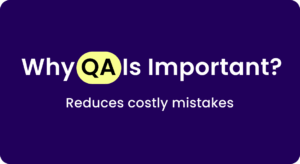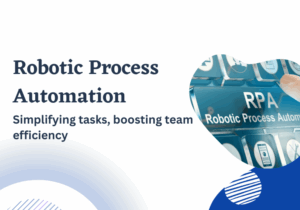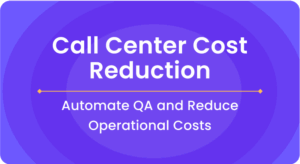Call quality – it’s not just a technical term; it’s your secret weapon in the battle for customer satisfaction and loyalty.
You can understand the importance of quality customer service from the fact that 91% of customers say they won’t willingly do business again with a company that left them unhappy.
Yes, you read that right – two out of three customers are ready to bid farewell to a business if their phone calls don’t meet the mark.
In today’s customer-centric world, your ability to deliver exceptional interactions over the phone can make or break your business.
So, what is call quality, and why should you pay attention?
In this article, we’ll break down call quality in simple terms, highlight its crucial role, and arm you with practical strategies to ace it. Let’s dive in!
A. What is call quality?
Call quality refers to the overall effectiveness and satisfaction level of a conversation between a customer and a service representative, typically in a call center setting.
It encompasses several elements, including the clarity of communication, resolution of customer issues, the agent’s professionalism, and the overall customer experience during the call.
When customer service representatives handle calls effectively, it not only improves the customer experience but also contributes to increasing customer lifetime value.
A successful interaction should leave customers impressed, provide clear solutions, and empower them to prevent future issues.
However, achieving this goal requires a focus on enhancing call quality.
Given that each representative possesses unique skills, monitoring call quality becomes vital in identifying and addressing skill gaps to consistently deliver exceptional customer experiences.
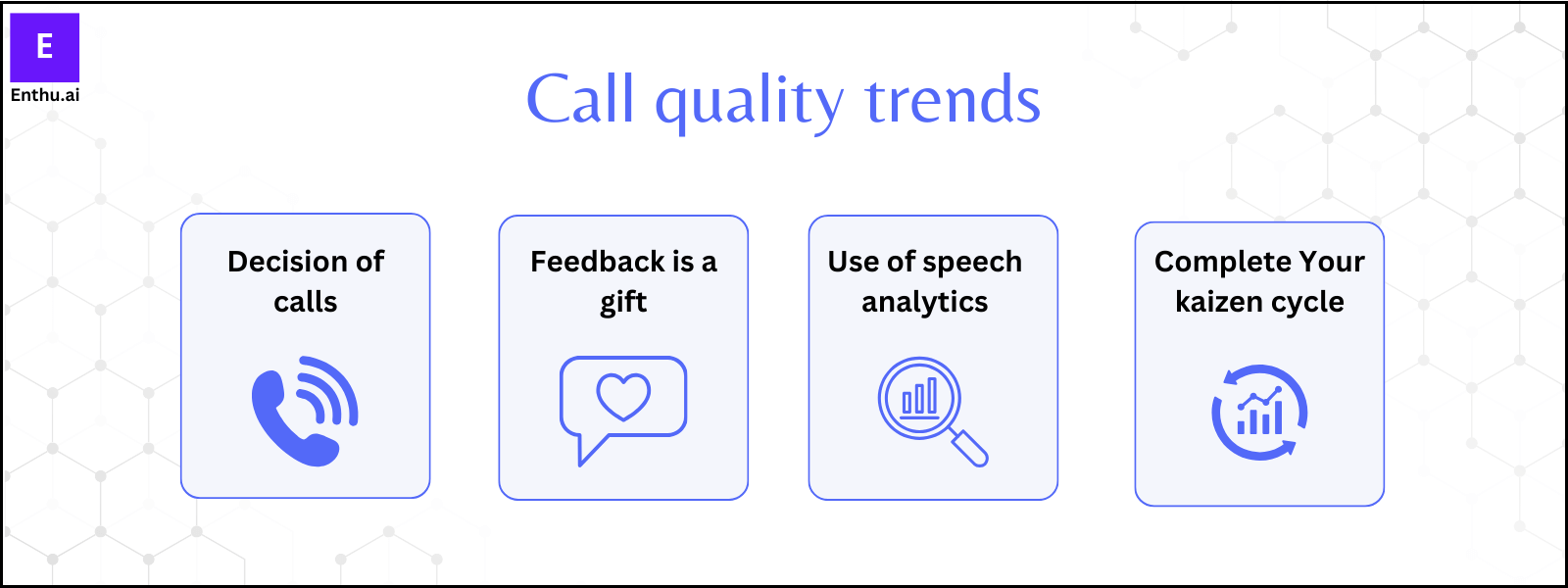
B. Quality monitoring and its importance
Quality monitoring refers to the systematic process of recording and reviewing the interactions between contact center agents and customers to ensure they meet specific quality standards and align with the organization’s goals and customer service objectives.
From call records to social media interactions, emails and surveys, any type of agent-customer interactions could be used for call quality monitoring.
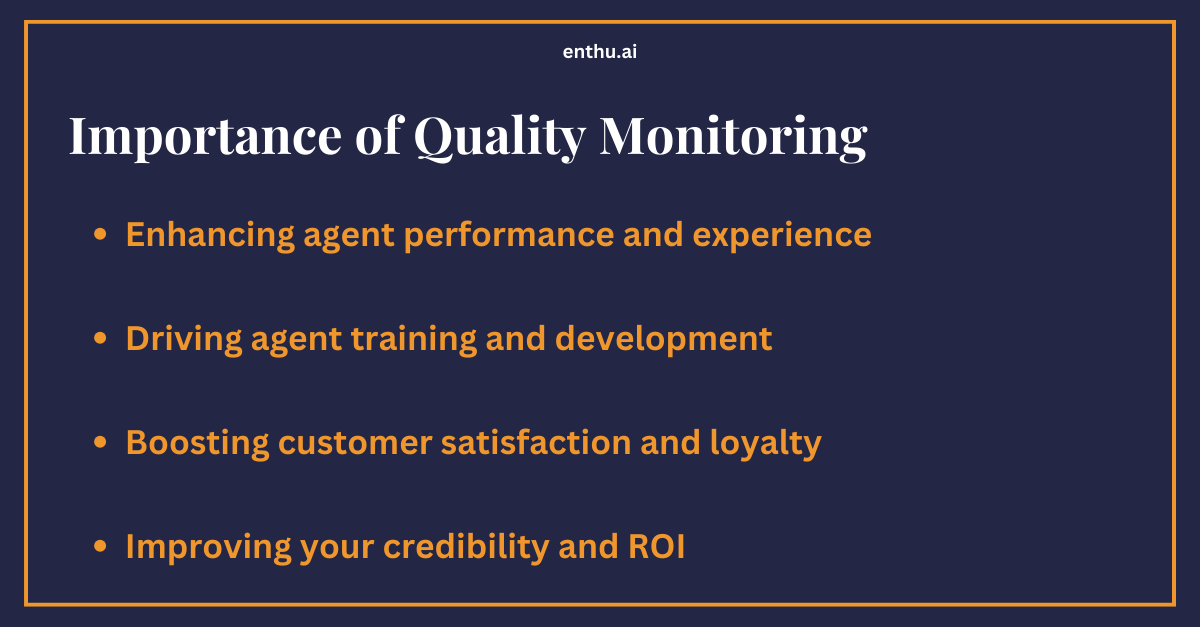
Quality monitoring in a contact center is crucial for maintaining a high level of customer satisfaction, attaining quality assurance, improving agent performance, and ultimately achieving business success.
1. Enhancing agent performance and experience
When call quality is monitored through agent quality monitoring, it helps identify where your agents excel and where they may need improvement.
This information is not just about assessing their work but also creating an environment where they can develop their call center skills and provide better service.
2. Driving agent training and development
Call quality monitoring is a valuable resource for your agents’ training and development providing insights into their performance and highlighting areas where they can improve their call center skills through call center agent monitoring software.
It pinpoints specific areas where they can grow, guiding their training towards these areas.
This ensures that your customer service agents’ professional growth is both focused and effective.
3. Boosting customer satisfaction and loyalty
Your organization’s interactions with customers have a direct impact on their satisfaction.
Higher call quality means happier customers.
Satisfied customers are more likely to stick around, remain loyal to your company, and even spread the word about the excellent service they received.
4. Improving your credibility and ROI
Providing consistently high call quality boosts your credibility as a customer service representative and your organization’s overall reputation.
Customers are more likely to trust your company when they consistently receive top-notch service.
This trust can lead to increased business, higher customer retention rates, and, ultimately, a better return on investment for your company.
C. How to improve call quality?
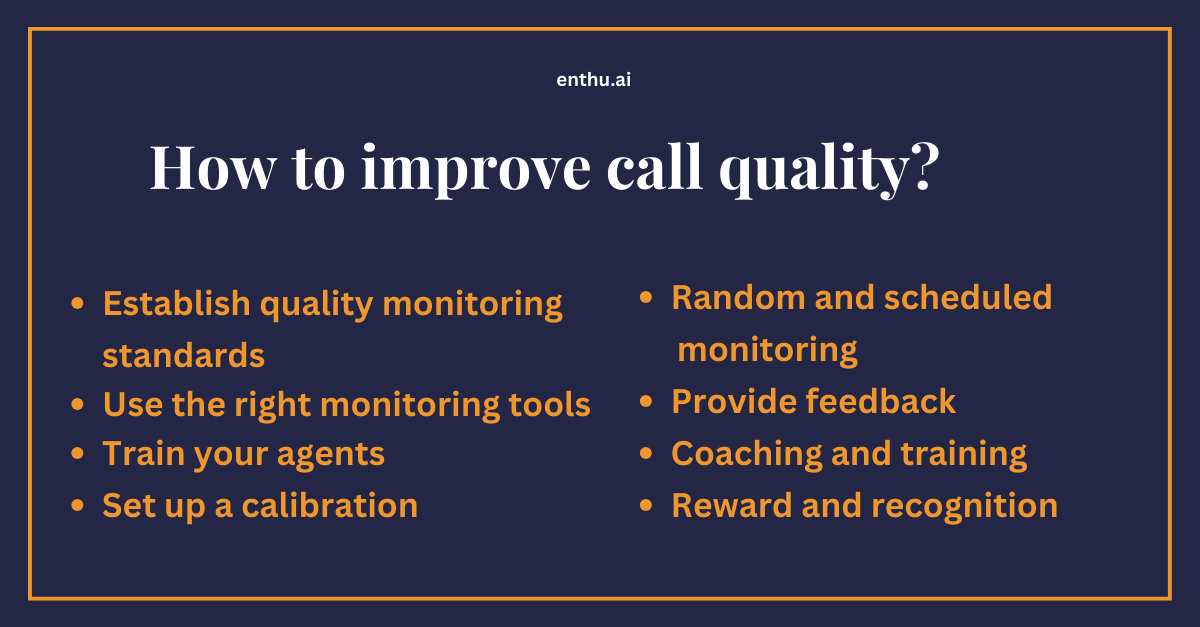
By implementing these detailed strategies, you can create a strong foundation for consistently high call quality in your customer service operations.
1. Establish clear quality standards (Scorecards)
Clear quality standards, or call monitoring scorecard, are like a roadmap for your customer service agents.
They should outline precisely what you expect from each call.
These standards can include things like:
- Politeness: Agents should greet customers courteously and use polite language throughout the call.
- Accuracy: They should provide correct information and avoid making promises they can’t keep.
- Resolution: The agent should aim to resolve the customer’s issue or question by the end of the call.
- Efficiency: Calls should be handled promptly without unnecessary delays.
With these scorecards in place, your agents will know exactly what’s expected of them on each call, helping them deliver better service.
2. Select the right monitoring tools
To improve call quality, it’s crucial to use the right tools for monitoring.
Imagine trying to fix a bike with a wrench when you need a screwdriver – it won’t work well.
Enthu.AI employs speech analytics and AI to automate call monitoring, providing insights on keywords, emotions, and sentiments.
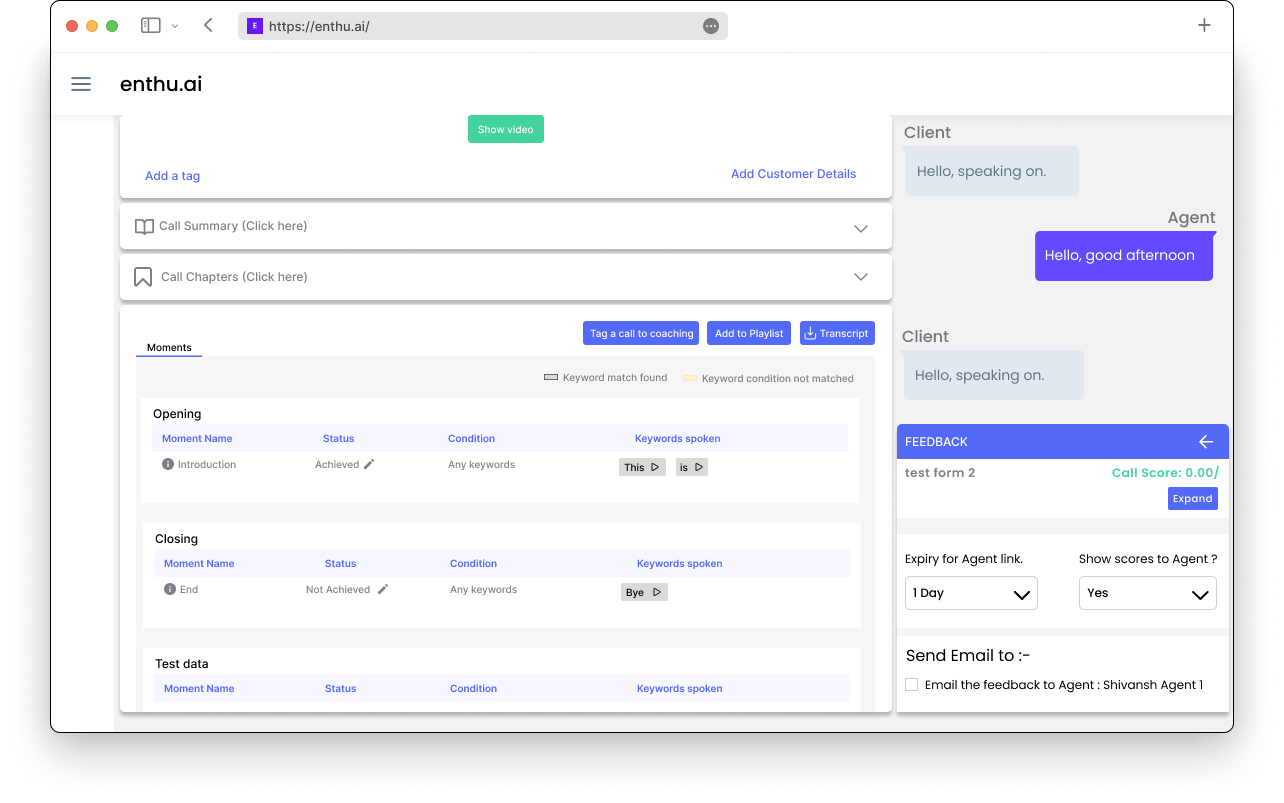 Similarly, you need specialized call center software or systems to monitor and evaluate calls effectively.
Similarly, you need specialized call center software or systems to monitor and evaluate calls effectively.
These tools can include:
- Call recording software: This records calls for later review.
- Quality assurance software: It helps evaluate calls based on predefined criteria.
- speech analytics software: This technology can automatically analyze call content for insights.
These tools provide you with the data and insights needed to identify areas for improvement.
3. Train your agents
Your customer service agents are like the stars of the show. To improve call quality, invest time and resources in training them.
Teach them about your products, customer service techniques, and how to handle difficult situations.
Training can cover
- Product knowledge: Ensure your agents understand your products or services inside and out.
- Communication skills: Teach them how to listen actively and communicate clearly.
- Conflict resolution: Equip them with strategies to handle upset customers.
The more knowledgeable and skilled your agents are, the better they’ll perform on calls.
4. Set up a calibration process
Think of calibration like tuning a musical instrument. It ensures that everyone is on the same page regarding what constitutes a good call.
It involves having multiple evaluators listen to and rate the same calls.
Here’s how it works:
- Multiple evaluators: Have different evaluators listen to and score the same calls.
- Compare scores: Discuss the scores and reasons behind them to reach a consensus.
- Adjust as needed: If there are discrepancies, make sure everyone understands the criteria better.
This process helps ensure fairness and consistency in evaluating call quality.
5. Random and scheduled monitoring
Imagine you’re a coach who sometimes watches practice games and sometimes surprises your team with unexpected evaluations.
Random and scheduled monitoring work in a similar way:
- Random monitoring: Select calls to evaluate without warning. This keeps agents on their toes and reflects real-world scenarios.
- Scheduled monitoring: Plan regular evaluations at predetermined times. This helps track long-term performance.
Combining both approaches gives you a comprehensive view of your agents’ abilities.
6. Provide feedback
Constructive feedback is essential. After listening to calls, provide constructive feedback to your agents.
Highlight what they did well and where they can improve.
- Positive feedback: Acknowledge what they did well to reinforce good practices.
- Constructive feedback: Point out areas for improvement and suggest actionable steps.
- Regular feedback: Provide feedback consistently to foster ongoing improvement.
This helps them understand their strengths and weaknesses, motivating them to do better.
7. Coaching and training
Use the insights from monitoring to offer personalized agent coaching and training including calling script. It involves one-on-one sessions to address specific areas where an agent may need improvement.
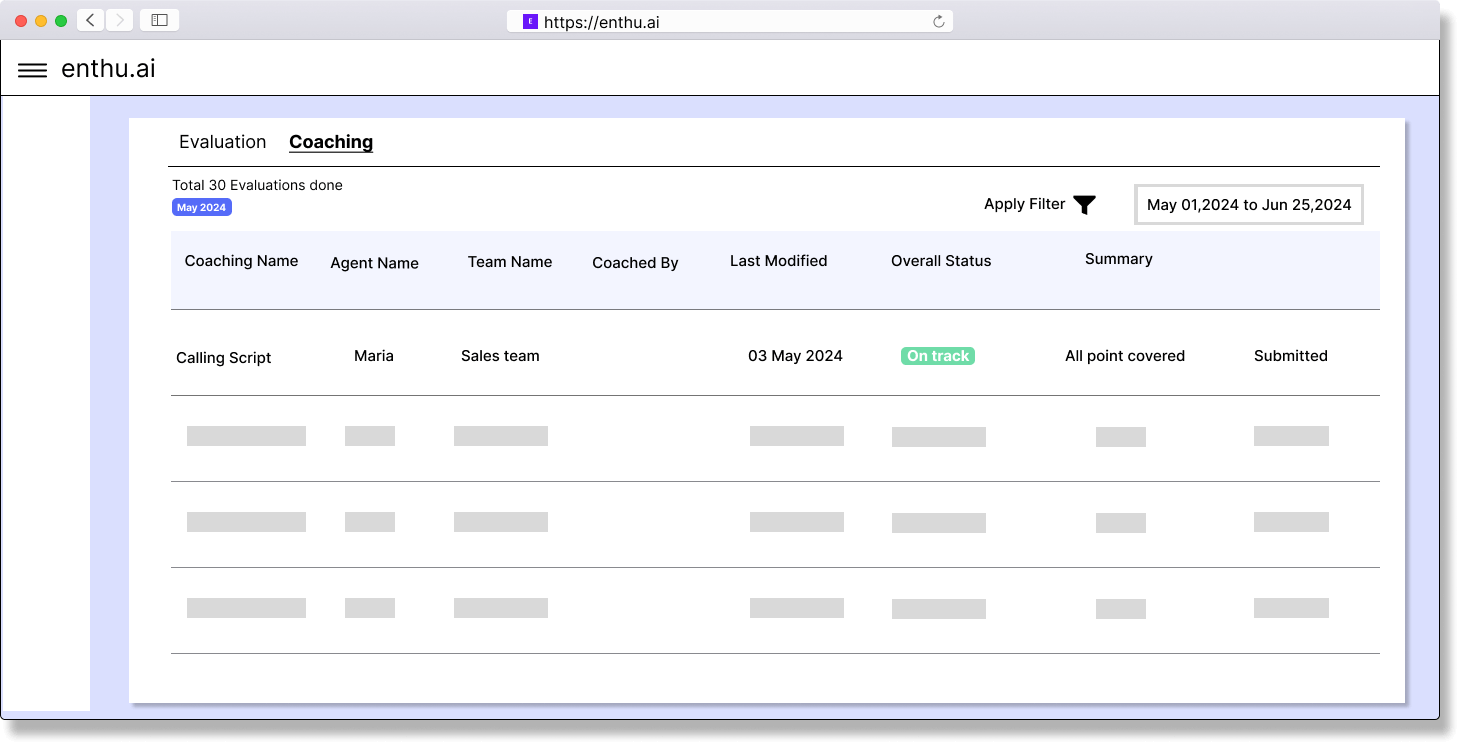
- One-on-one coaching: Address individual agent weaknesses or challenges.
- Additional training: Offer specialized customer service training sessions or resources as needed.
- Progress tracking: Monitor improvement over time and adjust coaching accordingly.
Provide additional call center training or guidance to help them enhance their skills and perform better on calls.
8. Reward and recognition
Everyone loves to be appreciated, right? Reward and recognition are like giving gold stars to students for their good work.
Recognize and reward agents who consistently deliver high-quality calls.
- Recognition: Publicly acknowledge agents who consistently excel in call quality.
- Rewards: Offer incentives such as bonuses, gift cards, or other perks to top performers.
- Motivation: Encourage other agents to aim for excellence by showcasing success stories.
This can boost their morale and motivate them to maintain or even improve call quality.
D. Use Enthu.AI to automate your call monitoring process
Leveraging advanced technologies can be a game-changer in the quest to enhance call quality.
Enthu.AI is an advanced call center call monitoring software and conversation intelligence software that utilizes speech analytics and AI-powered tools to automate call monitoring.

Enthu.AI employs speech analytics and AI to automated call quality monitoring, providing insights on keywords, emotions, and sentiments.
Quality scoring ensures unbiased evaluations, while trend analysis offers proactive issue resolution.
Moreover, evaluation management simplifies call assessments, fostering collaboration between agents and supervisors.
Conclusion
By embracing the strategies detailed in this article, from setting explicit quality standards and employing the right call center monitoring software to delivering feedback, coaching, and recognition, you lay the groundwork for a consistent high-quality call center.
In today’s competitive landscape, where customer experience is paramount, prioritizing call quality becomes not just a choice but a strategic necessity.
And for that extra edge, contemplate harnessing advanced technologies like Enthu.AI.
It offers many cutting-edge features to automate your call monitoring process. Enthu.AI takes your quality assurance to new heights, making it faster, more efficient, and precisely targeted.
FAQs
1. What is quality in a call?
Call quality refers to the overall effectiveness and satisfaction level of a conversation between a customer and a service representative, typically in a call center setting.
2. How often should quality monitoring be conducted?
Quality monitoring should be conducted regularly, with a mix of random and scheduled evaluations. The frequency may vary depending on the size of the call center and the volume of calls.
3. Can automation tools like Enthu.AI completely replace human call quality monitoring?
Automation tools like Enthu.AI can streamline and enhance call quality monitoring processes but may not completely replace human evaluators. Human judgment and empathy remain essential in some cases, particularly for nuanced interactions.
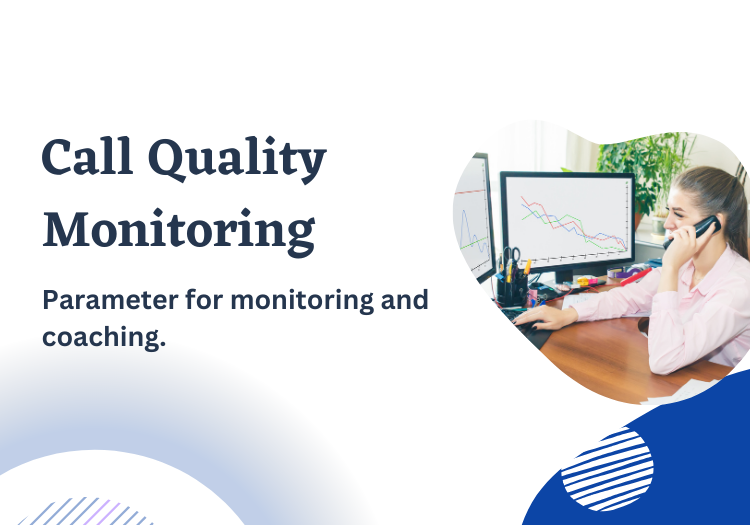
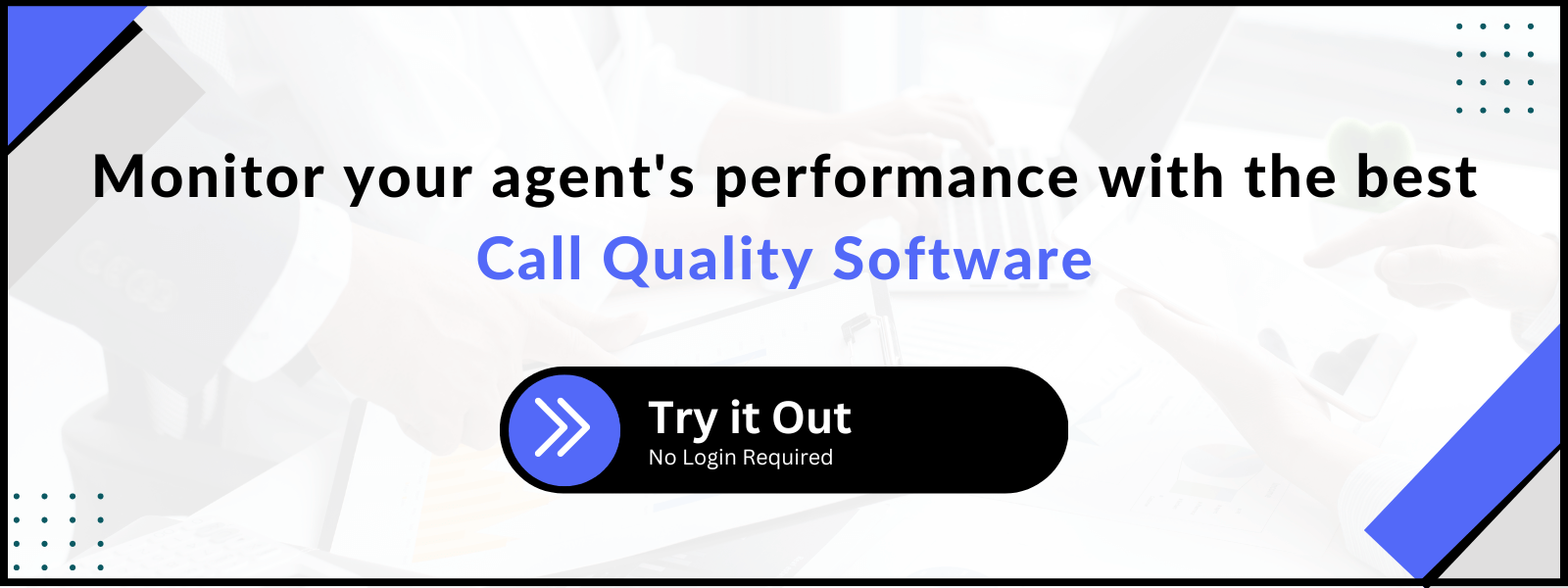


 On this page
On this page
